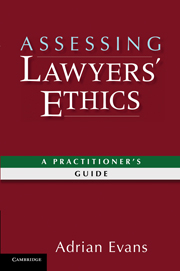Book contents
- Frontmatter
- Contents
- Preface
- List of figures
- Acknowledgements
- 1 An opportunity for law societies
- 2 Ethical failures, research and core qualities
- 3 Understanding ethical methods and types
- 4 Mechanisms to offset business pressure on legal ethics
- 5 Discovering practitioners' opinions about ethics assessment and psychological testing for integrity
- 6 Developing character
- 7 Measuring awareness of values and ethics
- 8 Entrenching ethics assessment
- Appendix A Research methods
- Appendix B Awareness of ethical type
- Appendix C Prototype scale of preference for legal ethical type
- Index
Appendix A - Research methods
The Melbourne Study
Published online by Cambridge University Press: 10 January 2011
- Frontmatter
- Contents
- Preface
- List of figures
- Acknowledgements
- 1 An opportunity for law societies
- 2 Ethical failures, research and core qualities
- 3 Understanding ethical methods and types
- 4 Mechanisms to offset business pressure on legal ethics
- 5 Discovering practitioners' opinions about ethics assessment and psychological testing for integrity
- 6 Developing character
- 7 Measuring awareness of values and ethics
- 8 Entrenching ethics assessment
- Appendix A Research methods
- Appendix B Awareness of ethical type
- Appendix C Prototype scale of preference for legal ethical type
- Index
Summary
A variety of approaches to gathering information was possible. Large-scale quantitative analyses, whether of the whole population of lawyers in Melbourne, in Victoria or even across Australia, or randomly constructed on a very large sample of those populations, might be ideal, but the scale and practicality of empirical enquiries impose limitations on all research designs. One way to understand what lawyers think about improving legal ethics would have been to invite every current practitioner to answer a detailed questionnaire, developed at length after several pilot studies and augmented by discrete focus groups. Extensive quantitative analysis of all results might then be matched to a text analysis of the focus groups. Alternatively, a random sample of a chosen lawyer population would be acceptable, but focus groups would still be a desirable quality control.
A quantitative, large-scale survey of all Melbourne lawyers (or a very large sample) was not undertaken for several reasons. Firstly, an entire population of one group of lawyers would still only be representative of one culture, not all jurisdictional cultures. The results of the survey and interviews do not attempt to define lawyers' opinions on anything more than a parochial level, so there is no advantage in surveying a whole population (even if that were feasible) as compared to an appropriate sample. Secondly, it was considered that the detailed and exhaustively analysed opinions of a randomly chosen group of 30 specialists were highly likely to reflect the range and sophistication of opinions held by larger groups practising in Melbourne.
- Type
- Chapter
- Information
- Assessing Lawyers' EthicsA Practitioners' Guide, pp. 240 - 249Publisher: Cambridge University PressPrint publication year: 2010

